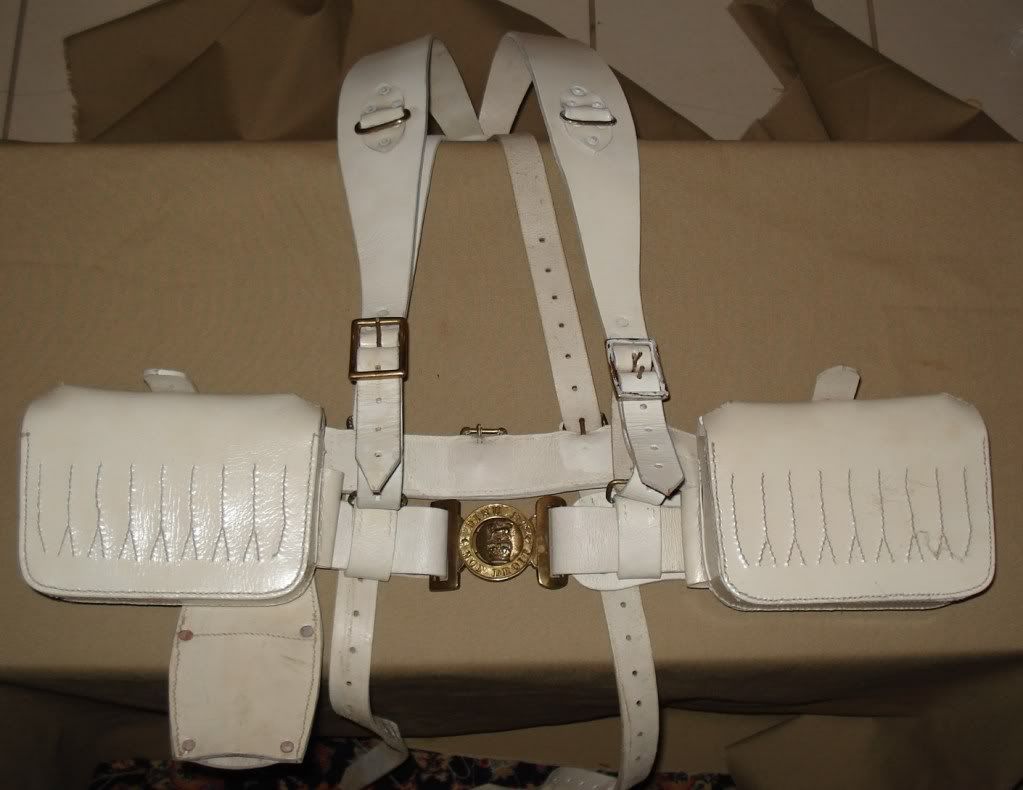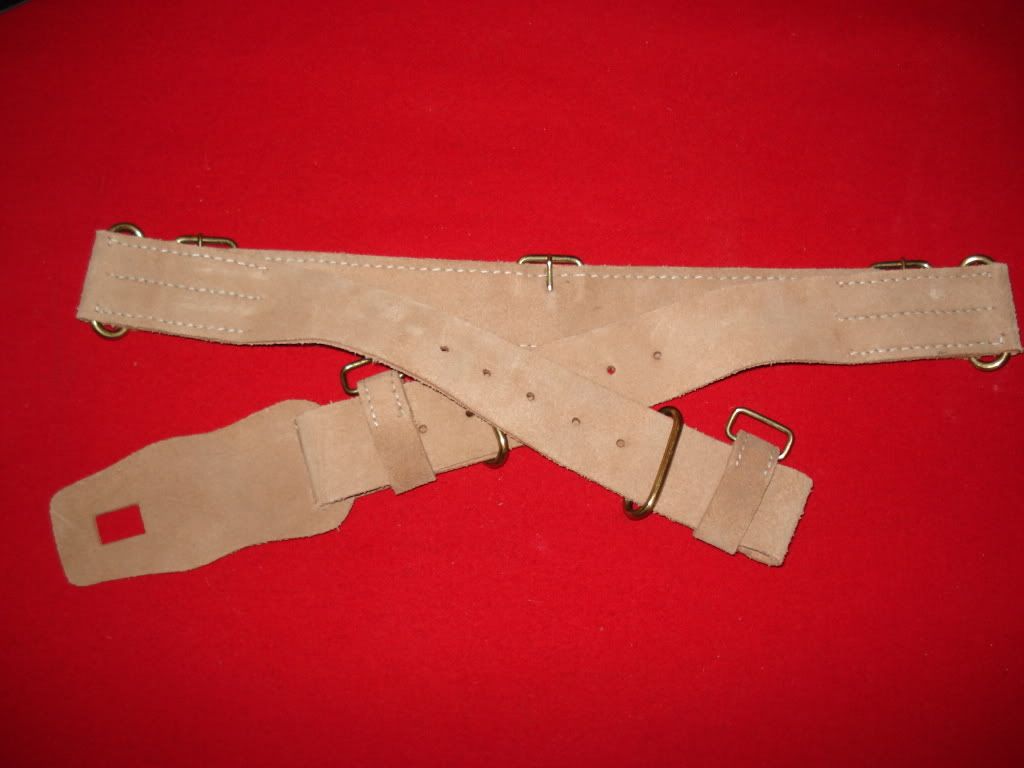|
-
25th April 11, 07:51 PM
#1
Help! Boer War Leatherworking Advice Needed
Calling all leatherworking experts! Artificer, Nighthawk, Donnie from Wyvern, anyone else with expertise ?!? I bought a set of Slade Wallace equipment for the new Boer War impression for which I'm collecting/making gear, and it needs to be renovated before it can be used.
The Problem
The leather of the Slade Wallace set that I bought is NOT PERIOD CORRECT, in that it has a patent leather-type finish, which has a hard, shiny surface. I would really like to find a way to get the surface into a period correct condition, as such sets are expensive.
Here is a close up of the offending surface:

The Solution?
On another forum dedicated to Victorian Wars, someone in the same fix stated that they had sanded off the improper finish to render the leather "natural" again ["Buff" is the term used in the British Army for the natural, or unfinished rough out leather surface]. I am looking for some specific advice about
(1) whether sanding the leather to remove the outer surface is a good idea or not;
(2) specific suggestions as to how to sand it, and what to use, i.e., what number grit sand paper, or if steel wool is recommended, what number steel wool?
(3) Are there any tools that are appropriate, like a power sander, or should this be done strictly by hand?
Here is an example of what the correct "natural" or "buff" surface looks like. A substance called Blanco is then applied to this surface to render it white, the white as you see Victorian era soldiers wearing in movies like "Zulu", or "Breaker Morant". However, the leather must be in this condition BEFORE it is made white:

I hope that several of you great leatherworkers will have some good ideas and strategies. Thank you in advance. Regards, BobsYourUncle
"Before two notes of the theme were played, Colin knew it was Patrick Mor MacCrimmon's 'Lament for the Children'...Sad seven times--ah, Patrick MacCrimmon of the seven dead sons....'It's a hard tune, that', said old Angus. Hard on the piper; hard on them all; hard on the world." Butcher's Broom, by Neil Gunn, 1994 Walker & Co, NY, p. 397-8.
-
-
25th April 11, 09:40 PM
#2
without seeing the specific piece in person, I can only issue the following warning.
Be greatly careful with "sanding" the surface. You're more than likely to sand off the outer stitching as well as the offensive finish.
If I was FORCED to make a recommendation, I'd do the main areas with a detail sander, and the areas w/stitching by hand, first with a wire brush and then with a sanding block, possibly masking off the stitches with tape for later "detail sanding" in a more careful fashion.
Best 'o luck. I don't envy you your project.
 ith: ith:
-
-
25th April 11, 09:51 PM
#3
Far from being any kind of leatherworker, I know that when attempting to recolour shoes there is a substance that strips the shine, gloss etc off so that the new dye can penetrate the leather. I have used it several times and the leather has not bee affected. I have purchased this from the local bootmaker.
You may find once you take the shine off that the white maybe able to be washed out in warm water as I did with a blancoed sporran bag
Shoot straight you bastards. Don't make a mess of it. Harry (Breaker) Harbord Morant - Bushveldt Carbineers
-
-
25th April 11, 09:59 PM
#4
 Originally Posted by Downunder Kilt

Far from being any kind of leatherworker, I know that when attempting to recolour shoes there is a substance that strips the shine, gloss etc off so that the new dye can penetrate the leather. I have used it several times and the leather has not bee affected. I have purchased this from the local bootmaker.
You may find once you take the shine off that the white maybe able to be washed out in warm water as I did with a blancoed sporran bag
Mike,
I think this goes beyond surface treatment. The harness is a VERY hard finished chrome tan, rather than a suede finish waiting for Blanco.
If I had my guess, I'd say it was built intending to resemble the suede + blanco without the hassle of actually having to do the work.
Short cuts usually = fail. Sad but true.
Also, the machine stitch is MUCH finer on the repro than it is on the original. (which is more of an aside than anything)
-
-
25th April 11, 10:30 PM
#5
I bow to your superior knowledge Scott, the last thing I would want to do is wreck the thing with with a suggestion doomed to failure. Cheers mate 
Shoot straight you bastards. Don't make a mess of it. Harry (Breaker) Harbord Morant - Bushveldt Carbineers
-
-
26th April 11, 05:37 AM
#6
 Originally Posted by Downunder Kilt

I bow to your superior knowledge Scott, the last thing I would want to do is wreck the thing with with a suggestion doomed to failure. Cheers mate 
Thanks for the vote of confidence, Mike, but I'm shooting in the dark really.
BTW, BobsYourUncle: Definitely DON'T use steel wool. The metal fibres get into the surface and will rust over time, leaving stains on the leather.
If it were me, I'd probably use a 220 grit sandpaper, but make sure to test it on a small area of leather that is out of view. Again, be really careful around the stitches. I'd mask them off during the main job and do those areas with a very small sanding block afterward.
-
-
26th April 11, 06:03 AM
#7
 Originally Posted by artificer

Best 'o luck. I don't envy you your project.
 ith:
Ditto. This job is going to $uck. Bigtime.
-
-
26th April 11, 06:49 AM
#8
I do not envy your upcoming adventure. If I were to do this using any sort of power tool, I would use a flap sander and go real slow.
Good Luck!
T
-
-
26th April 11, 07:05 AM
#9
The shiny white layer could be the result of several processes, but the most likely one is some form of plastic/lacquer compound painted onto the leather when it was still in the full skin rather than individual pieces.There are various compounds around to clean leather before dyeing it, but I'm not sure that they are really designed to strip a complete finish.
Sanding it of course is an option, but in doing so you will most likely sand through all the stitching which will have to be re done.
If the shiny surface is the result of post manufacture colour, you will be much luckier.
have a look at fiebings where there are lots of tips on how to treat/dye and look after leather as well!
Good luck
-
-
26th April 11, 07:35 AM
#10
 Originally Posted by artificer

without seeing the specific piece in person, I can only issue the following warning.
Be greatly careful with "sanding" the surface. You're more than likely to sand off the outer stitching as well as the offensive finish.
If I was FORCED to make a recommendation, I'd do the main areas with a detail sander, and the areas w/stitching by hand, first with a wire brush and then with a sanding block, possibly masking off the stitches with tape for later "detail sanding" in a more careful fashion.
Best 'o luck. I don't envy you your project.
 ith:
 Originally Posted by artificer

Thanks for the vote of confidence, Mike, but I'm shooting in the dark really.
BTW, BobsYourUncle: Definitely DON'T use steel wool. The metal fibres get into the surface and will rust over time, leaving stains on the leather.
If it were me, I'd probably use a 220 grit sandpaper, but make sure to test it on a small area of leather that is out of view. Again, be really careful around the stitches. I'd mask them off during the main job and do those areas with a very small sanding block afterward.
 Originally Posted by paulhenry

The shiny white layer could be the result of several processes, but the most likely one is some form of plastic/lacquer compound painted onto the leather when it was still in the full skin rather than individual pieces.There are various compounds around to clean leather before dyeing it, but I'm not sure that they are really designed to strip a complete finish.
Sanding it of course is an option, but in doing so you will most likely sand through all the stitching which will have to be re done.
If the shiny surface is the result of post manufacture colour, you will be much luckier.
have a look at fiebings where there are lots of tips on how to treat/dye and look after leather as well!
Good luck
THANK YOU ALL! Great stuff, this is exactly the kind of input for which I was hoping. Yes, Artificer [Scott], I do feel forced into at least trying to sand the gear, having spent the money.
I will set myself up with a detail sander, a sanding block, some 220 grit paper, and then make some tests in areas out of view. I will report the results as soon as I can, with photos and possible future queries. PaulHenry, thanks for the link, I will look into that.
Thank you all again! Regards, BYU
"Before two notes of the theme were played, Colin knew it was Patrick Mor MacCrimmon's 'Lament for the Children'...Sad seven times--ah, Patrick MacCrimmon of the seven dead sons....'It's a hard tune, that', said old Angus. Hard on the piper; hard on them all; hard on the world." Butcher's Broom, by Neil Gunn, 1994 Walker & Co, NY, p. 397-8.
-
Similar Threads
-
By attworth in forum DIY Showroom
Replies: 7
Last Post: 4th August 08, 04:51 PM
-
By RamsayClanCommish in forum Kilt Advice
Replies: 13
Last Post: 19th July 08, 06:22 PM
-
By beloitpiper in forum Miscellaneous Forum
Replies: 30
Last Post: 16th June 08, 11:31 PM
-
By Nighthawk in forum Kilt Advice
Replies: 22
Last Post: 28th March 08, 01:01 PM
-
By Dirka Skene in forum Kilt Advice
Replies: 13
Last Post: 2nd February 07, 06:34 PM
 Posting Permissions
Posting Permissions
- You may not post new threads
- You may not post replies
- You may not post attachments
- You may not edit your posts
-
Forum Rules
|
|

